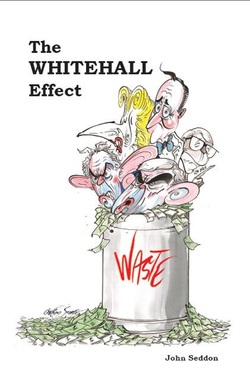The Whitehall Effect ~ John Seddon - Online Notes
|
Links below take you to the chapter notes:
Introduction 1. Prelude Part 1: The industrialisation of public services 2: Call centres 3. Back Offices 4. Shared Services 5. Outsourcing 6. Information Technology Part 2: Delivering services that work Introduction 7. A better philosophy 8. Effective change starts with ‘study’ 9. Better thinking, better design 10. ‘Locality’ working 11. IT as pull, not push Part 3: Things that make your head hurt 12. Targets and standards make performance worse 13. Inspection can’t improve performance 14. Regulation is a disease 15. It’s the system, not the people 16. Incentives always get you less Part 4: ideology, fashions and fads 17. Choice 18. Personal Budgets 19. Commissioning 20. Managing demand 21. Nudge 22. Procurement 23. Risk management 24. Lean 25. IT: features over benefits Part 5 Change must start in Whitehall 26. Beware economists bearing plausible ideas 27. Whitehall is incapable of doing evidence 28. Getting a focus on purpose |
Introduction
1] From www.ukpublicspending.co.uk/recent_spending – ‘UK public spending hit £150 billion in the mid 1980s and increased slowly to £180 billion in 1989. But then spending started to accelerate in the early 1990s, hitting £200 billion in 1990 and £284 billion by 1995. Increases in public spending were modest in the late 1990s, reaching £338 billion in 2000. The early 2000s showed an acceleration in spending, breaching £500 billion in 2006. Then the financial crisis of 2008 took over, boosting public spending over £600 billion in 2009. Public spending is expected to breach £700 billion in 2014.’ 2] Institute for Fiscal Studies, May 2010, Election Briefing Note No. 5. View 3] Greg Clark, December 2012, Decentralisation: an assessment of progress, Dept. for Communities and Local Government (DCLG), p.4. View |

